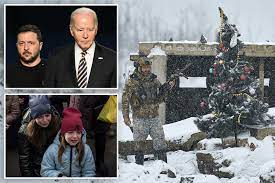In a strategic pivot, the Biden administration, in collaboration with European counterparts, is reportedly recalibrating its approach to the ongoing conflict in Ukraine. Instead of solely pursuing a decisive victory over Vladimir Putin’s forces, the focus is now shifting towards bolstering Ukraine’s negotiating position. This change comes in the wake of President Zelensky’s stalled counteroffensive and challenges in securing additional aid.

Shoring Up Defenses
To enhance Ukraine’s bargaining power, the new strategy involves fortifying defensive capabilities. Plans include reinforcing air defense systems and constructing new works along the eastern front and the northern border with Belarus. The goal is to ensure Ukraine is well-positioned for negotiations to bring an end to the prolonged conflict.
Negotiation as the Endgame
A White House spokesperson highlighted the administration’s long-standing belief that the conflict’s resolution lies in negotiation. The aim is to equip Ukraine with the strongest possible hand for diplomatic talks. Despite acknowledging the difficulties faced by Ukraine, officials express confidence in the country’s resilience, emphasizing that negotiation remains the ultimate path to ending the war.
Potential Cease-Fire and Geopolitical Implications
Experts speculate that the defensive strategy might lead to a cease-fire with Moscow. However, this could pose challenges, potentially resulting in a divided Ukraine. As time becomes a critical factor, Ukraine’s manpower and industrial capacity are deemed disadvantaged, even with continued Western support. The evolving situation underscores the need for strategic decisions that consider long-term implications.
EU’s Role and NATO Membership
The European Union may expedite Ukraine’s NATO membership, aiming to enhance its negotiating stance despite the military stalemate. While this move could strengthen Ukraine, it may provoke Putin, who opposes Ukraine joining the alliance. President Biden continues to support Ukraine’s NATO aspirations, emphasizing its place in the organization’s future.
Putin’s Response and Skepticism
Putin’s willingness to compromise remains uncertain. Reports of potential compromises, such as allowing Russia to retain seized territories, have been met with skepticism by the Biden administration. The spokesperson stressed that, as of now, there are no serious discussions on such matters, highlighting the lack of indication from Putin regarding genuine negotiations.
Conclusion: The Complex Path Ahead
As the dynamics of the conflict evolve, the Biden administration navigates a complex path, balancing diplomatic efforts with the challenges posed by Putin’s strategic decisions. The emphasis on negotiation reflects a nuanced understanding of the geopolitical landscape, acknowledging that a lasting resolution requires diplomatic engagement, even amid military standoffs. The future remains uncertain, requiring careful consideration of each strategic move.
Read Also – Getting Around the Oregon Kicker Tax Credit: Quick Tips
















